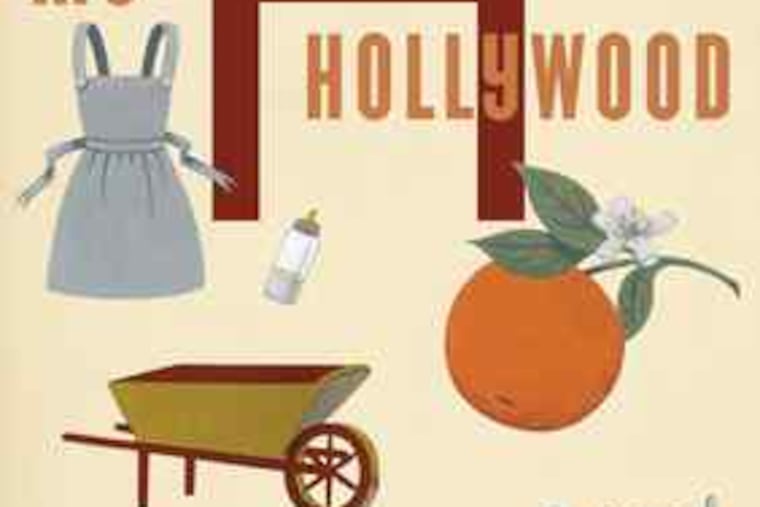'My Hollywood' - oh, my!
The author's previous novels were charming, if disorganized. Here, the chaos is intolerable.

By Mona Simpson
Alfred A. Knopf. 384 pp. $26.95
nolead ends nolead begins
Reviewed by Abby Frucht
Mona Simpson's fifth novel bears many a resemblance to its sprawling predecessors, among them her celebrated debut
Anywhere but Here
(1986), about a girl and her self-absorbed mother making an impetuous cross-country drive.
Simpson's second novel, The Lost Father (1992), along with her third, A Regular Guy (1996), made similar use of an intentionally disorganized structure, allowing their protagonists to roam, digress, obsess, and repeat themselves while moving haplessly backward and forward along spiraling, tumultuous, and curiously suspenseful narratives.
The result was darkly charming. Readers, compelled to tag alongside the often irrational dreams, hopes, and delusions of Simpson's characters, were at once entertained and dismayed by their journeys.
A PEN/Faulkner Award nominee for her fourth novel, Off Keck Road (2000), and winner of a Whiting Award and an Academy Award in Literature from the American Academy of Arts and Letters, Simpson has set her latest in parts of Hollywood rarely visited by reporters from People magazine or camera crews from Lives of the Rich and Famous. Here, we find playgrounds and schools populated by ordinary, if upper-middle-class, families and their immigrant nannies.
Claire, a new mother whose husband writes with mixed success for television, struggles to balance her desire to raise their toddler, Will, and maintain a just-burgeoning career as a composer, working in a dreary upstairs office.
Their nanny, Lola, has left her large family in the Philippines in hopes of turning "a servant's wage into private school tuition for her own children," as Simpson has written about nannies in a New York Times op-ed.
Lola prides herself on her skills as impromptu matchmaker, modeling agent, marriage counselor, and sage. She confides:
"If you are smart, when something happens, if the baby takes his first step or says the first word, the first of Williamo was 'light,' second 'French,' third 'fries,' you keep in your private journal so you will have the true date but do not tell. You wait and that evening or the next they will call you shrieking, Lola, Lola come here!"
Lola also reveals her worries about the reluctance of Will's parents to address the toddler's inappropriate behavior: " . . . the hitting, that I really do not know. Claire, she is nervous. And the guy, he is not strong. . . . I am the one to explain: Williamo, that you cannot do."
A busybody with a good heart and resentment to match, Lola struggles, like Claire, to walk a tricky line between the kind of domestic friendship that evolves when women share a household, not to mention a child, and the tensions that accompany their status as privileged (and sometimes disgruntled) employer and disgruntled (but sometimes indulged) employee.
Although it's never quite clear, to them or us, whether money trumps loyalty or vice versa, their stations remain worlds apart. In her Times op-ed, Simpson remarked on those worlds, pointing out that the needs of nanny and employer "intersect in the gray economy" in a "workplace so ungoverned" that it resembles "the Wild West, rife with temptation for exploitation and abuse."
In addition to leveling an astute gaze on matters of class, My Hollywood critiques today's gender roles, which in the case of Claire and Paul are a dismaying reminder of Marilyn French's 1977 novel The Women's Room. When Claire complains to a friend, "I didn't get married to have dinner every night with my kid and a maid," the friend replies, "You leave him . . . you're still going to be having dinner every night with your kid. And maybe not the maid."
As Michael Chabon blurbs, Simpson's gifts "for artful indirection, and for the deft unfurling of imagery," are evident here.
Even so, may I call this a simply dreadful book?
Simpson's penchant for undisciplined narrative, which made her other books so enjoyable, is over the top. Like many reviewers, I read an uncorrected proof, which the publisher advises should not be quoted without comparison with the finished book. Such comparison seems pointless here. Reading My Hollywood is like reading four drafts of the same novel incorrectly overlaid. Moments, phrases, scenes, accidentally and/or on purpose repeat themselves, their essence revisited 10 times over. The plot is inextricable from its own retellings. Claire's passivity overwhelms, and Lola's righteousness annoys.
The reader feels drugged, the boredom bores. Some of the best lines describe Claire's methods for composing music, the way an impulse strikes her and takes shape in her mind. A piece of music composed like My Hollywood might be quite marvelous, but the applause, this time, will be for the parts, not for the whole.